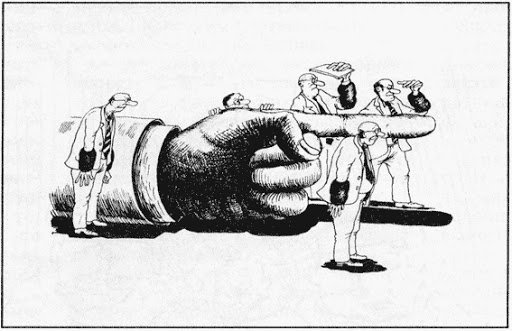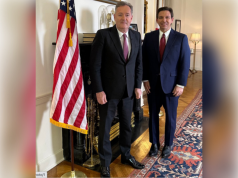A trilateral meeting between Vladimir Putin, Ilham Aliyev and Nikol Pashinyan in the Russian capital, Moscow, on January 11, during which an agreement was reached on the construction of a new railway line between Armenia and Russia via Azerbaijan, remains an important issue in the Georgian political spectrum. Discussions mainly involve an issue, what the project will change in the region and what positions the states will take under the new agenda. Most experts or politicians agree on one thing: the new railway, which will connect Armenia with Russia on the one hand and Azerbaijan with Turkey on the other, will call into question Georgia’s transit function and potential. Moreover, according to them (experts), Georgia may be subject to a kind of economic blockade, which, naturally, will significantly weaken its position both in the region and in the international political arena. What will this agreement change for Georgia and what geopolitical adjustments will it make in the agenda of the region – Gulbaat Rtskhiladze, the head of the Eurasia Institute, talks about these and other important issues.
– Mr. Gulbaat, the trilateral agreement reached between Armenia, Azerbaijan and Russia, according to which a new railway connecting Armenia with Russia via Azerbaijan and a new railway connecting Azerbaijan with Turkey via Armenia should be built, is the subject of active discussions in Georgia. The government does not seem to notice, but many say that the country is losing its transit function … What is really changing for us?
– This new transit corridor is a distant prospect and statements on this issue serve to ease the situation after the Karabakh war. Anyway so far all this leaves such an impression. As for Georgia, and specifically the idea that we may lose our transit function, let’s start with the fact that Georgia is fighting with its wrong and absolutely inadequate approaches, because at a time when the country is in economic crisis and cargo through ports is already reduced, it facilitates the construction of Turkish railways and at the same time, refuses to consider resuming communications with Russia through the Abkhazia and Roki tunnels. Turkey and Azerbaijan already have all kinds of communications with each other via Georgia, so from a purely economic point of view, they do not need much to carry cargos through Armenia. In general, Georgia, as a transit country, is in their best interests, because both Turkey and Azerbaijan know very well that the Georgian government will never oppose this communication and will not impose new conditions, unlike Armenia, which may be a more unreliable partner in this regard. This is a reality. Therefore, the assessments that Armenia is gaining a new transit function and because of this the economic agenda in the region is fundamentally changing, I think is a bit unrealistic. Here, there is simply one thing: Azerbaijan is interested in having a humanitarian corridor with direct access to Nakhchivan, while Armenia, which already has only an enclave in Azerbaijan in the form of Karabakh, needs to communicate with Stefanakert. This exchange is real, but I repeat: it can not be a road of great strategic importance, which can compete with the transit communications through Georgia.
– However, perhaps the most important point here is that Turkey is also interested in having additional communications from Azerbaijan. Is this obvious?
– Of course, Turkey has this interest and it is not surprising, because in doing so it is gaining another lever in the region. The position of Russia is also interesting here, which, in fact, refuses to gain influence in Georgia and tries to make some strange rectangles with Azerbaijan and Armenia by some detours. I think it is not preconditioned by a good life . . .

As for our country, Georgia, of course, is not a sovereign state and it does not have the ability to make decisions independently, as all this is delegated to Washington and Ankara, although it must be said that a small part of our sovereignty has been taken away by Baku. Therefore, in any context, in any geopolitical conjuncture, we are only a matter for discussion and the object of agreement between the great powers; To put it more simply, whatever Washington, Turkey and Azerbaijan decide will be Georgia’s guiding policy. Here is our sad reality, which probably is not news to anyone.
– You mentioned the agreement between the big states. Do you think that the fact that in the current situation Russia is not actually trying to gain influence in Georgia, which, from an objective point of view, probably does not correspond to its interests, could indicate any agreement?
– In any case, one thing is already clear: Russia’s interest in Armenia and Azerbaijan has increased, and this is quite logical. Moreover, I think that what happened recently between Armenia and Azerbaijan, Aliyev had agreed in advance with Moscow. Fashinyan probably knew about this agreement and there is a big chance that he was part of this deal. That is, what actually happened was that Armenia had to seize control of territories that were not part of the Karabakh Autonomy, plus the city of Shusha – historically an Azerbaijani city. All this was returned to Aliyev. By the way, at the end of October, Putin, if I am not mistaken, said in a dialogue with the members of the Valdai Discussion Club on October 27 that for 30 years, Azerbaijan has been waiting for the return of non-Karabakh territories … It was straightforward, without any diplomatic A statement that gave a green light to specific actions in Baku. Of course, this was not a spontaneous statement, the agreement already existed.
– As for the consequences, of course, the agreement and the end of the war did not end the Caucasian game in Karabakh. We are already seeing a rather pretentious Turkey and its President Erdogan, who directly stated these days: We must reach an agreement in Karabakh that its Armenian population does not need physical protection from peacekeepers . . . I.e. we will provide security guarantees and no Russian peacekeepers will be needed there. If Russia looks at it as if it does not see it, etc., it is not good for it, because Russia, due to its strategic interests, definitely needs control over the Caucasus, including strategic control over Georgia, which is not against Georgia’s interests at all.
– Let us explain to the reader more specifically what strategic control means or may imply.
– Strategic control, first of all, means that Georgia is in Russia’s geopolitical orbit; That Georgia should not be an opponent of Russia, should not be a NATO ally here, should not be in the region pursuing American strategic interests; Must not establish American military bases here, etc. This is what Russia is interested in, otherwise for a hundred years it will not be interested in who will enter the parliament here with how many quotas, which law will be passed, how to improve, for example, the rights of transgender people, and so on.
As for Georgia’s position on all this, we say that it is a loss of independence, a rejection of sovereignty, democracy, a bright future, a “historic election” and what I know is a “good” thing, but what we see in today’s Georgian political landscape, It turns out ass if there was real independence.
– However, there is probably a separate issue here, whether all this coincides with the real moods of the society
– Let’s be honest: there is no society in Georgia. Here everyone is shaking in his soro and morcha. Unfortunately, this is already an area that has been devastated, and it seems like nothing can help it. It will not help because, as I told you, Georgia is completely sovereign. As for the solution to the idea, geopolitical logic dictates that Georgia, Russia and Armenia should cooperate actively. They should cooperate not only economically, but also politically, and most importantly, in terms of security. That is, there should be coordination between them and, in parallel, of course, dialogue with both Turkey and Azerbaijan. . .
– Do you think this is possible under this government?
– To say frankly, I do not want to talk about this government, because what we are seeing and hearing, especially lately, is complete cretinism. You see, Gakharia was not spoken at the party congress. . . They can not go beyond that, that is all. So what opportunities are we talking about. . . With this policy and it is no longer called politics, of course, the prospect is zero. What this reality brings and what it will bring in the future is already clear. . .
Interviewed by Jaba Zhvania








